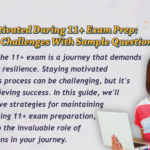Sleep Patterns and 11+ Exam Performance: A Vital Aspect of the Admissions Process
The 11+ exam is a pivotal moment in a student’s academic journey, determining their admission to prestigious grammar and selective schools. While academic preparation is paramount, the role of sleep patterns in 11+ exam performance is often underestimated. In this comprehensive guide, we will delve into the crucial connection between sleep and exam performance, emphasizing its significance within the broader admissions process. Understanding how sleep impacts cognitive function and implementing strategies for better sleep can greatly enhance a student’s chances of success.
The Importance of Sleep :
Quality sleep is essential for overall health and cognitive function. During sleep, the brain undergoes critical processes, consolidating information, and supporting memory retention. Adequate sleep also contributes to mood stability, attention span, and problem-solving abilities.
The 11+ Exam and Cognitive Demands :
The 11+ exam is academically rigorous, assessing students in subjects such as math, English, verbal reasoning, and non-verbal reasoning. These subjects demand high-level cognitive skills, including critical thinking, problem-solving, and effective communication. To perform well, students need their cognitive functions to be at their peak.
Sleep Patterns and Cognitive Performance :
The relationship between sleep patterns and cognitive performance is well-established. Insufficient or poor-quality sleep can lead to:
Impaired Attention:
Sleep-deprived individuals often struggle with maintaining focus and attention, a crucial aspect of tackling complex 11+ exam questions.
Memory Deficits:
Sleep plays a crucial role in consolidating and organizing memories. Inadequate sleep can hinder a student’s ability to recall information effectively.
Reduced Problem-Solving Skills:
The 11+ exam often presents challenging problems that require creative solutions. Sleep deprivation can impair problem-solving skills.
Mood Disturbances:
Poor sleep can lead to mood swings and increased irritability, affecting a student’s emotional well-being during exam preparation.
Strategies for Improved Sleep :
To optimize sleep patterns and enhance 11+ exam performance, consider the following strategies:
Establish a Consistent Sleep Schedule:
Encourage students to go to bed and wake up at the same time each day, even on weekends. Consistency reinforces the body’s natural sleep-wake cycle.
Create a Relaxing Bedtime Routine:
Engage in calming activities before bedtime, such as reading, gentle stretching, or meditation. Avoid stimulating activities like screen time.
Maintain a Comfortable Sleep Environment:
Ensure that the sleep environment is conducive to rest. This includes a comfortable mattress and pillows, a dark room, and a moderate room temperature.
Limit Caffeine and Sugary Foods:
In the hours leading up to bedtime, reduce the consumption of caffeine and sugary snacks, which can interfere with sleep.
Exercise Regularly:
Encourage physical activity, but avoid vigorous exercise close to bedtime. Regular exercise can promote better sleep.
Manage Stress:
Teach stress management techniques, such as deep breathing exercises or journaling, to help students cope with exam-related anxiety.
Limit Screen Time:
Exposure to screens before bedtime can disrupt sleep patterns due to the blue light emitted. Encourage students to power down devices at least an hour before bedtime.
Balanced Diet:
Emphasize the importance of a balanced diet that includes nutrients essential for sleep, such as magnesium and tryptophan found in foods like bananas and almonds.
The Broader Impact on the Admissions Process :
The 11+ exam is just one element of the admissions process, but it holds significant weight in determining a student’s future educational path. When students are well-rested and mentally alert, their chances of performing at their best are greatly enhanced. This not only impacts their exam scores but also their overall application.
Furthermore, demonstrating the ability to manage stress and maintain healthy sleep patterns can be seen as a valuable life skill by admissions boards. It showcases a student’s readiness for the demands of selective education and their ability to excel in a challenging academic environment.
Conclusion :
Sleep patterns are a vital aspect of the admissions process for 11+ exams. By recognizing the crucial role of sleep in cognitive performance and implementing strategies for better sleep, students can significantly improve their chances of success in the exam. Additionally, a well-rested and mentally alert student is better equipped to excel in the broader admissions process, demonstrating readiness for the rigors of selective education.
As parents, educators, and students themselves, it’s essential to prioritize healthy sleep patterns in the lead-up to the 11+ exam. By doing so, we not only enhance academic performance but also foster lifelong habits that promote well-being and success in all aspects of life. In the competitive landscape of selective schools, sleep can be the unsung hero that empowers students to shine brightly in the 11+ exam and beyond.
why not try www.pre11plus.co.uk. – Intuitive & Predictive Learning Platform
join pre11plus whatsapp group for regular updates – pre11plus
Pre11Plus – Nurturing Individual Excellence in Every Learner












